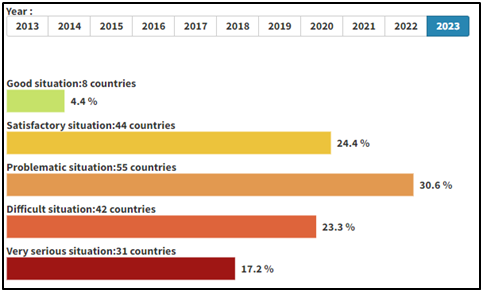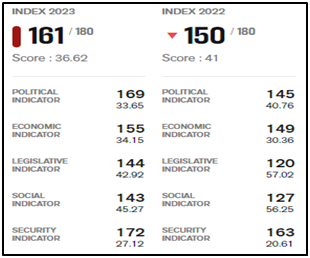Why in News?
- Media associations in the country have voiced concern over India slipping 11 places to 161st rank in the World Press Freedom Index 2023.
What’s in Today’s Article?
- What is the World Press Freedom Index?
- The World Press Freedom Index 2023
- Situation in India
- Indian Government’s take on the Previous World Press Freedom Index
- Steps Taken by Indian Government to Promote Press Freedom
What is the World Press Freedom Index?
- It is an annual ranking of countries compiled and published by France-based global media watchdog Reporters Without Borders (RSF) since 2002
- It intends to reflect the degree of freedom that journalists, news organisations, and netizens have in each country, and the efforts made by authorities to respect this freedom.
- It only deals with press freedom and does not measure the quality of journalism in the countries it assesses, nor does it look at human rights violations in general.
- A new methodology devised in 2021 is based on a definition of press freedom as
- the ability of journalists as individuals and collectives
- to select, produce, and disseminate news in the public interest
- independent of political, economic, legal, and social interference and
- in the absence of threats to their physical and mental safety.
- It uses five new indicators: political context, legal framework, economic context, sociocultural context and safety.
The World Press Freedom Index 2023:
- It evaluates the environment for journalism in 180 countries and territories and Norway is ranked first for the seventh year running.
- The last three places are occupied by: Vietnam, China, and North Korea (180th).
- This Index spotlights the rapid effects that the digital ecosystem’s fake content industry has had on press freedom.
- The difference is being blurred between true and false, real and artificial, facts and artifices, jeopardising the right to information.
- Last in the regional ranking, the Middle East and North Africa (MENA) continues to be the world’s most dangerous region for journalists.

Situation in India:

- The situation has gone from “problematic” to “very bad” in India, along with Tajikistan and Turkey.
- In India, media takeovers by oligarchs close to the government have jeopardised pluralism and restricted free flow of information.
Indian Government’s take on the Previous World Press Freedom Index:
- Freedom of speech and expression (press freedom is a part of it) is a constitutionally guaranteed fundamental right to citizens under Article 19(1) with restrictions as stated in Article 19(2).
- Under the Article 19(2), the state is empowered to impose reasonable restrictions on the operation of the right in the interest of
- Sovereignty and integrity of India,
- Security of the state,
- Friendly relations with foreign states,
- Public order, decency or morality or
- In relation to contempt of court, defamation or incitement to an offence
- The government does not subscribe to the country’s ranking and to the conclusions drawn by the Index.
- This was due to various reasons, including very low sample size, little or no weightage to fundamentals of democracy, adoption of a methodology which is questionable and non-transparent.
Steps Taken by Indian Government to Promote Press Freedom:
- G7 countries and partner countries (including India) adopted a ‘Resilient Democracies Statement’ at the 2022 G7 Summit affirming their commitment to strengthening the resilience of democracies.
- An advisory on the safety of journalists was issued to states and UTs in 2017, requesting them to strictly enforce the law to ensure the safety and security of media persons.
- The Press Council of India (PCI), a statutory autonomous body, has been set up under the Press Council Act, 1978, mainly to preserve the freedom of the press and improve the standards of newspapers and news agencies.
- It considers complaints filed ‘by the press’ concerning curtailment of press freedom, physical assault/attack on journalists, etc.
- For television, all channels are required to adhere to the Programme Code under the Cable Television Networks (Regulation) Act, 1995.
- For digital news publishers, the IT (Intermediary Guidelines and Digital Media Ethics Code) Rules, 2021 under the IT Act, 2000, has been notified.










